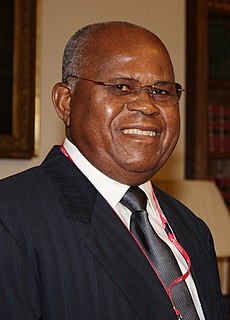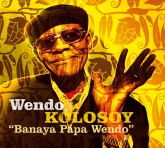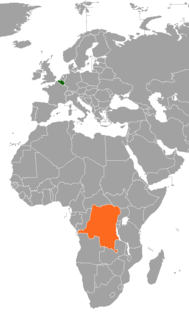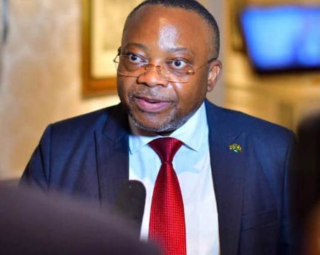
The Democratic Republic of the Congo,informally Congo-Kinshasa,DR Congo,the DRC,the DROC,or the Congo,and formerly and also colloquially Zaire,is a country in Central Africa. It is,by area,the second largest country in Africa,and the 11th-largest in the world. With a population of around 92 million,the Democratic Republic of the Congo is the most populous officially Francophone country in the world. It is a member of the United Nations,Non-Aligned Movement,African Union,COMESA,and the East African Community. The capital and largest city is Kinshasa,which is also the world's most populous Francophone city.

Léon Kengo wa Dondo is a Congolese politician who served as the "first state commissioner" several times under Mobutu Sese Seko in Zaïre. He was one of the most powerful figures in the regime and was a strong advocate of economic globalization and free-market economics. He served as President of the Senate of the Democratic Republic of the Congo from 2007 to 2019.

Étienne Tshisekedi wa Mulumba was a Congolese politician and the leader of the Union for Democracy and Social Progress (UDPS),the main opposing political party in the Democratic Republic of the Congo (DRC). A long-time opposition leader,he served as Prime Minister of the country on three brief occasions:in 1991,1992–1993,and 1997.
The Movement for the Liberation of the Congo is a political party in Democratic Republic of the Congo. Formerly a rebel group operating in the Democratic Republic of Congo that fought the government throughout the Second Congo War,it subsequently took part in the transitional government and is one of the main opposition parties.
Mbuyamu Ilankir "Freddy" Matungulu (born January 4,1955 Belgian Congo is a Congolese economist. He was Minister of Finance of the Democratic Republic of the Congo from 2001 to 2003.
Azarias Ruberwa Manywa is a Congolese politician,lawyer,and public figure. During the Second Congo War he was Secretary-General of the Rassemblement Congolais pour la Démocratie (RCD-G) rebel group. Following the war he was one of the vice-presidents in the transitional government of the Democratic Republic of the Congo between 2003-2006. He has also been the leader and president of RCD-G's political party since 2003. He is a member of the Banyamulenge community of South Kivu who belong to the Tutsi tribe.
Thomas Lubanga Dyilo is a convicted war criminal from the Democratic Republic of the Congo (DRC) and the first person ever convicted by the International Criminal Court (ICC). He founded and led the Union of Congolese Patriots (UPC) and was a key player in the Ituri conflict (1999–2007). Rebels under his command have been accused of massive human rights violations,including ethnic massacres,murder,torture,rape,mutilation,and forcibly conscripting child soldiers.

Antoine Wendo Kolosoy,known as Papa Wendo,was a Congolese musician. He is considered the "Father" of Congolese rumba,also known as soukous,a musical style blending son cubano,beguine,waltz,tango and cha-cha.

Denis Kalume Numbi is a general and a politician in the Democratic Republic of the Congo (DRC). He was part of the Antoine Gizenga government as Minister of State for the Interior,Decentralization and Security. He was replaced in this position on 26 October 2008 by Celestin Mbuyu Kabango when the government headed by Adolphe Muzito was formed.

Belgium–Congo relations refers to relations between the Kingdom of Belgium and the Democratic Republic of the Congo. The relationship started with the exploration of the Congo river by Henry Morton Stanley.
Emile Bongeli Yeikelo Ya Ato is a politician in the Democratic Republic of the Congo (DRC). In the first cabinet of Adolphe Muzito,from October 2008 to February 2010,he was Deputy Prime Minister for Reconstruction.
Matata Ponyo Mapon is a Congolese political figure who was Prime Minister of the Democratic Republic of the Congo from 18 April 2012 to 17 November 2016. Previously he served as Minister of Finance from 21 February 2010 to 12 April 2012;as Prime Minister,he retained responsibility for the finance portfolio.
Guy Bomanyama-Zandu is a filmmaker from the DRC.
Bestine Kazadi Ditabala,,is a Congolese writer.

The Congolese National Police is the national police force of the Democratic Republic of the Congo. The national police consists of 110,000–150,000 officers and operates on the provincial level,answering to the Interior Ministry. It is known in the DRC for corruption,repression of political dissidents,and other human rights abuses. It is currently undergoing reforms. A police academy is being built.

Samy Badibanga Ntita is a Congolese politician who was Prime Minister of the Democratic Republic of the Congo from November 2016 to May 2017. He was also on the ballot for the 2018 Democratic Republic of the Congo general election as a presidential candidate.

Marcel Antoine Lihau or Ebua Libana la Molengo Lihau was a Congolese jurist,law professor and politician who served as the inaugural First President of the Supreme Court of Justice of the Congo from 1968 until 1975 and was involved in the creation of two constitutions for the Democratic Republic of the Congo.

Léonard She Okitundu Lundula is a Congolese diplomat who has served as the Minister of Foreign Affairs and International Cooperation and one of the Vice Prime Ministers of the Democratic Republic of the Congo since December 2016 until March 2019. He has formerly held a number of other government offices in the DRC and Zaïre,being the Foreign Minister before (2000–2003),a Senator,and also chief of staff of President Joseph Kabila's administration.
Jeanine Mabunda is a Congolese lawyer and politician who in 2019 became the first woman elected to lead the Democratic Republic of the Congo's National Assembly. She was impeached on December 10,2020,through a democratic vote by the National Assembly with 281 votes.

Faustin Luanga is a Congolese politician and career diplomat who has been Ambassador-at-large for the Democratic Republic of the Congo since 4 June 2021.











